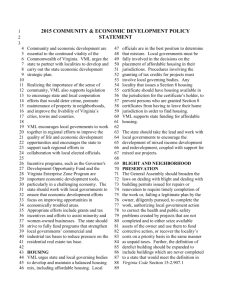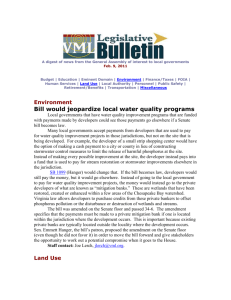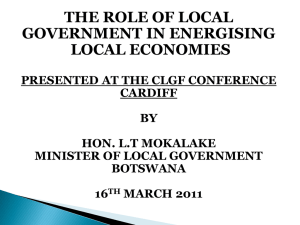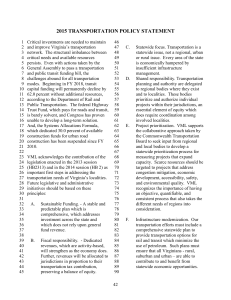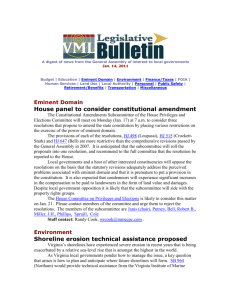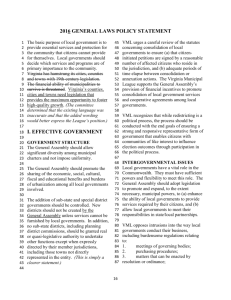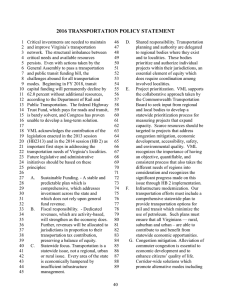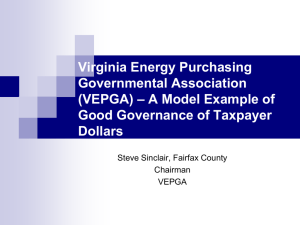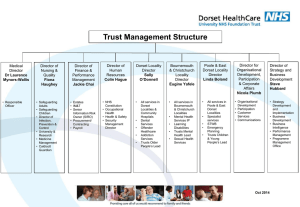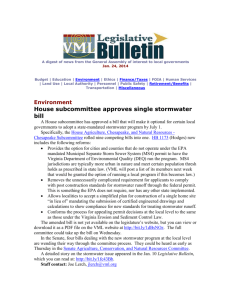2016 community & economic development policy statement
advertisement
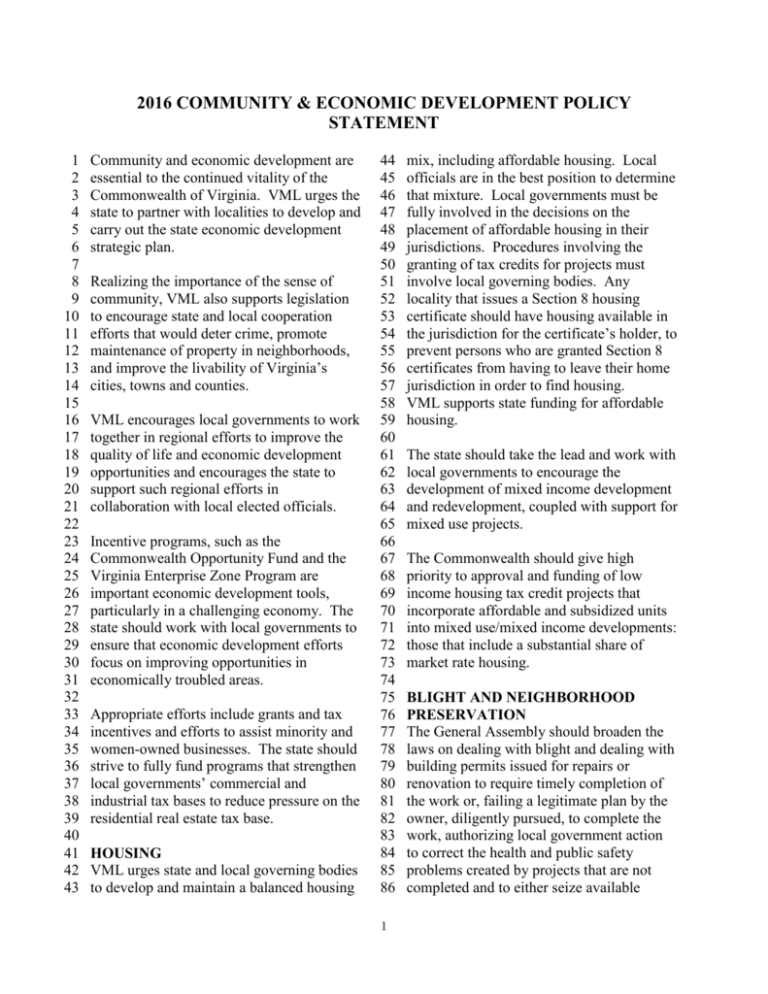
2016 COMMUNITY & ECONOMIC DEVELOPMENT POLICY STATEMENT 1 2 3 4 5 6 7 8 9 10 11 12 13 14 15 16 17 18 19 20 21 22 23 24 25 26 27 28 29 30 31 32 33 34 35 36 37 38 39 40 41 42 43 Community and economic development are essential to the continued vitality of the Commonwealth of Virginia. VML urges the state to partner with localities to develop and carry out the state economic development strategic plan. Realizing the importance of the sense of community, VML also supports legislation to encourage state and local cooperation efforts that would deter crime, promote maintenance of property in neighborhoods, and improve the livability of Virginia’s cities, towns and counties. VML encourages local governments to work together in regional efforts to improve the quality of life and economic development opportunities and encourages the state to support such regional efforts in collaboration with local elected officials. Incentive programs, such as the Commonwealth Opportunity Fund and the Virginia Enterprise Zone Program are important economic development tools, particularly in a challenging economy. The state should work with local governments to ensure that economic development efforts focus on improving opportunities in economically troubled areas. Appropriate efforts include grants and tax incentives and efforts to assist minority and women-owned businesses. The state should strive to fully fund programs that strengthen local governments’ commercial and industrial tax bases to reduce pressure on the residential real estate tax base. HOUSING VML urges state and local governing bodies to develop and maintain a balanced housing 44 45 46 47 48 49 50 51 52 53 54 55 56 57 58 59 60 61 62 63 64 65 66 67 68 69 70 71 72 73 74 75 76 77 78 79 80 81 82 83 84 85 86 1 mix, including affordable housing. Local officials are in the best position to determine that mixture. Local governments must be fully involved in the decisions on the placement of affordable housing in their jurisdictions. Procedures involving the granting of tax credits for projects must involve local governing bodies. Any locality that issues a Section 8 housing certificate should have housing available in the jurisdiction for the certificate’s holder, to prevent persons who are granted Section 8 certificates from having to leave their home jurisdiction in order to find housing. VML supports state funding for affordable housing. The state should take the lead and work with local governments to encourage the development of mixed income development and redevelopment, coupled with support for mixed use projects. The Commonwealth should give high priority to approval and funding of low income housing tax credit projects that incorporate affordable and subsidized units into mixed use/mixed income developments: those that include a substantial share of market rate housing. BLIGHT AND NEIGHBORHOOD PRESERVATION The General Assembly should broaden the laws on dealing with blight and dealing with building permits issued for repairs or renovation to require timely completion of the work or, failing a legitimate plan by the owner, diligently pursued, to complete the work, authorizing local government action to correct the health and public safety problems created by projects that are not completed and to either seize available 1 2 3 4 5 6 7 8 9 10 11 12 13 14 15 16 17 18 19 20 21 22 23 24 25 26 27 28 29 30 31 32 33 34 35 36 37 38 39 40 41 42 43 44 45 46 47 assets of the owner and use them to fund corrective action, or recover the locality’s costs on a priority basis in the same manner as unpaid taxes. Further, the definition of derelict building should be expanded to include buildings which are never completed to a state that would meet the definition in Virginia Code Section 15-2.907.1 VML supports strengthening the minimum housing maintenance code. ZONING INCENTIVES FOR IN-FILL DEVELOPMENT AND REDEVELOPMENT The state code provisions on zoning authority should continue to ensure that local governments have a full range of authority to promote affordable and mixed income housing, including authority to facilitate in-fill development, redevelopment and mixing of uses in redevelopment projects. Therefore, the code must not be changed to limit local governments’ authority to enact land use regulations for the benefits of all citizens of a locality. PLANNING AND LAND USE The Governor and General Assembly should continually evaluate the limitations on local authority and land use management tools provided in the state code to ensure that the policies of the Commonwealth encourage and support healthy cities and towns. The Commonwealth must end state laws that encourage sprawl or that discourage mixeduse, inclusive communities at sustainable densities. Instead, the policies of the Commonwealth should support sustainable growth in and around urban centers to help local governments create more livable, environmentally responsible communities, thus reducing the environmental impact of growth. In addition, the policies should alleviate transportation funding problems for the Commonwealth and should promote transportation priorities to promote public 48 49 50 51 52 53 54 55 56 57 58 59 60 61 62 63 64 65 66 67 68 69 70 71 72 73 74 75 76 77 78 79 80 81 82 83 84 85 86 87 88 89 90 91 92 93 94 2 transportation modes as well as pedestrian and bicycle transportation. VML supports multi-modal transportation options for regions and localities. Further, to make movement into urban centers attractive, the education policies and funding must promote high quality educational facilities, opportunities and services in urban centers. Further the Commonwealth must provide funding to help urban centers attract and retain high quality jobs. Planning and land use control are two of local government’s most important functions. Localities must maintain control of local land use decisions. Neither the state nor federal government should usurp a locality’s power to make such decisions. All localities should be guided by their comprehensive plan for future development. The General Assembly should allow local governments to exercise land use authority in the manner that the local government deems appropriate for its circumstances. Coordination of local land use planning and transportation planning improves the ability of all levels of government to deal with and manage growth-related issues the Commonwealth faces in the long-term. The General Assembly should enhance local government’s ability to implement their comprehensive plans by authorizing a complete spectrum of land use and growth management tools and should allow and provide localities more creative, locally initiated planning and land use mechanisms. However, sufficient fiscal capacity is necessary to take advantage of more robust planning and land use mechanisms. When a county’s transfer of development rights program includes lands adjacent to a city or town, the General Assembly should provide the municipality authority to fully 1 2 3 4 5 6 7 8 9 10 11 12 13 14 15 16 17 18 19 20 21 22 23 24 25 26 27 28 29 30 31 32 33 34 35 36 37 38 39 40 41 42 43 44 45 46 participate in the decisions on transferring such rights when it is determined by the municipality that the land-use change will impact its citizens. VML supports the state’s exploration of sustainable development, provided that there is not an effort to supplant the authority of local governments to determine their own land use policies, and encourages the consideration of incentives for localities to implement sustainable development approaches. State agencies should be required to comply with local comprehensive plans and local land use regulations and policies. VML supports enhanced redevelopment opportunities through the adoption of an urban policy for the commonwealth, and implementation of growth management policies that encourage growth and economic development in urban areas. VML supports the position that the vested rights law is prospective only and that local governments have the authority to amend zoning ordinances in the future. The law on nonconforming uses and structures must not be diminished. The desires of a single property owner should not outweigh the interests of the neighbors, who benefit from properties coming into conformance with the zoning ordinance over time through the effects of the law on nonconformity. The General Assembly should not enact any legislation, under the name of private property protection law, that seeks to weaken local powers to regulate land uses and protect the community’s health, safety and welfare, or that requires additional compensation beyond judicial interpretation of the Fifth Amendment of the U.S. 47 48 49 50 51 52 53 54 55 56 57 58 59 60 61 62 63 64 65 66 67 68 69 70 71 72 73 74 75 76 77 78 79 80 81 82 83 84 85 86 87 88 89 90 91 92 93 3 Constitution and Article I, section II of the Virginia Constitution. VML opposes any additional legislation that would exempt religious organizations from neutral, generally applicable local ordinances, and in particular, local zoning and public safety ordinances. RESPONSIBLE GROWTH MANAGEMENT Current state land use authority is often inadequate to allow local governments to provide for growth in a manner that protects and improves the quality of life in our communities. The General Assembly should authorize local governments to implement growth management policies including impact fees in order to enable localities to facilitate orderly, rational growth in a manner appropriate to their communities. The authority to impose impact fees should include calculations for the cost of all public infrastructure, including school construction costs, caused by growth. Until a comprehensive impact fee system is authorized, the code should extend to all localities full authority for conditional zoning to meet the needs of new citizens for public infrastructure. The General Assembly should take all steps needed to assist towns and cities to work with the surrounding counties to promote growth in patterns that help the vitality of the municipalities. Any change must not shift the burden of paying for new infrastructure to existing citizens through increased real estate taxes. DESIGN FOR ALL CITIZENS. As life expectancy rises and as the number of citizens with significant physical disabilities and limitations increases, Virginia’s local governments recognize that the man-made environment must be made accessible to and inclusive of all citizens, 1 2 3 4 5 6 7 8 9 10 11 12 13 14 15 16 17 18 19 20 21 22 23 24 25 26 27 28 29 30 31 32 whether aging, disabled or facing other limitations. Therefore, the state’s laws, regulations and policies must serve to increase accessibility for ageing and disabled populations. Such laws, regulations and policies that do not assist reaching these goals should be amended or repealed. Building codes should be amended to help achieve these goals in new and existing construction. Further, state laws, regulations and policies must be amended, as needed to give local governments full authority to provide accessible private and public infrastructure. MANUFACTURED HOUSING BY RIGHT Local governments must retain the authority to plan for the appropriate mix of residential structures in their communities, and must retain full authority to regulate the placement of manufactured homes, without state intervention. Localities should retain the right to tax manufactured homes as personal property, and not be forced to classify them as realty. SUBDIVISION STREET STANDARDS Local governments should have authority to modify standards for street pavement and right-of-way widths, including streets 33 34 35 36 37 38 39 40 41 42 43 44 45 46 47 48 49 50 51 52 53 54 55 56 57 58 59 60 61 62 63 4 brought into the system that do not meet VDOT standards, that are beneficial to good planning; public safety; and the well-being of the residents, without diminishing state funding for street maintenance payments. PRESERVATION OF RIGHTS-OFWAY Road projects take many years from the planning stage to construction. Often localities need to reserve miles of right-ofway years in advance of any funding availability for these projects, or risk development in the path of these road projects. Localities need tools to enable them to reserve rights-of-way for longer periods of time. The official map legislation allows reservation but localities are often unable to provide for the upfront funding needed to purchase these rights-of-way in the allotted timeframe. VARIANCES, SPECIAL EXCEPTIONS & CONDITIONAL USE PERMITS VML maintains that the law on variances should be retained in its current form. Because land use is controlled at the local level, the General Assembly should not require any specific procedures for special exceptions, conditional use permits or similar land use decisions.
